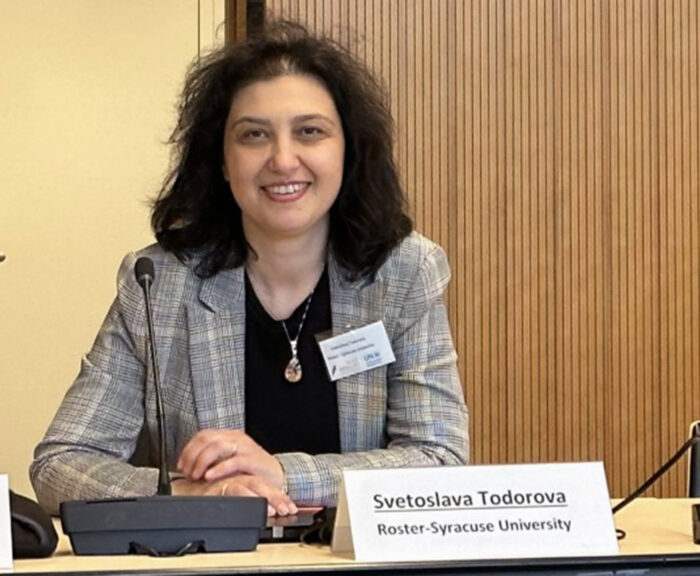
The work of environmental engineers and scientists is governed by regulations. In international negotiations and conventions, governmental representatives make the final decisions, but representatives from non-governmental organizations are sought to inform the process. It is a critical role because input from experts shape the regulations to ensure the best possible outcomes for our environment. Civil and Environmental Engineering Professor Svetoslava Todorova has been involved with the United Nations Environment Programme (UNEP) since 2010. The UNEP is responsible for coordinating responses to environmental issues within the United Nations.
“I have been passionate about participating in international efforts to address environmental issues since a young age. It has been an incredible journey to build and direct my professional life around this cause, and I am excited to make the most of this opportunity,” says Todorova.
Todorova started as a science observer during the UNEP intergovernmental negotiations on mercury. Those negotiations led to the development of the Minamata Convention on Mercury in 2013. The purpose of the convention was to draft an international treaty designed to protect humans and the environment from the release of mercury compounds. Todorova made an important contribution to the treaty and continued her involvement.
“One specific contribution was a sentence in the treaty text that considers the co-benefits of treatment technologies,” says Todorova. “Now, I am part of a scientific group that was formed in 2022 to develop the framework for assessing the Convention’s implementation.”
Todorova’s involvement with the UNEP evolved out of the Minamata Convention. From 2017-2019 she served as a communications liaison for the Fate and Transport group under the Global Mercury Partnership, a scientific advisory body on mercury to the UNEP. In June 2022, she became a member of a working group that was tasked with the development of a framework for a future science-policy panel on the management of chemicals and waste. In October 2022, she was elected to a group tasked with developing a plan to evaluate the effectiveness of the Minamata Convention.
“The group’s mandate is to provide a plan for data analysis and identify any existing gaps in monitoring, which will be presented to the 5th Conference of Parties (COP) of the Convention in October 2023 for discussion and voting,” says Todorova.
The COP is the governing body of the convention that makes decisions for its implementation and evaluation. Todorova’s involvement in the mercury negotiations has enabled Syracuse University to become an accredited observer institution, allowing students and faculty to participate in the COP.
“The accredited observer status given to Syracuse University provides opportunities to contribute to the work of the UNEP,” says Todorova. “Being an accredited observer under one convention allows us to participate in the negotiation and implementation of other Multilateral Environmental Agreements (MEAs), such as the recent negotiations on a new treaty to address global environmental issues on plastics. This ensures that we have a continuous presence and input on the process.”
In November 2019, Todorova brought a group of 11 students to attend COP3 of the of the Minamata Convention as part of an Honors course on environmental science-policy. At the COPs, students have the opportunity to sit amongst policymakers and get a sense of the complexity of negotiating agreements on environmental issues. This fall another group of students will have a similar opportunity.
“I am teaching The Role of Science in Environmental Governance in the fall of 2023. As part of the class, students and I will travel to Geneva, Switzerland to attend COP5 of the Minamata Convention on Mercury,” says Todorova.
Todorova says Syracuse University and ECS have been very supportive of her involvement with the UNEP. Her work embodies the College of Engineering and Computer Science’s commitment to meaningful interaction with the world and positively impacting the public.
“I started attending the negotiations for the Minamata Convention on Mercury while I was still a doctoral student in the civil and environmental engineering department,” says Todorova. “Over the years, my participation has been supported with the financial support of the Graduate Student Organization, the Civil and Environmental Engineering Department, and the Dean’s Office at the College of Engineering and Computer Science.”
